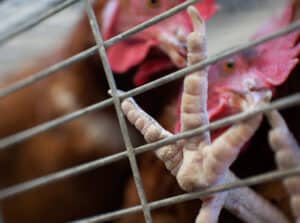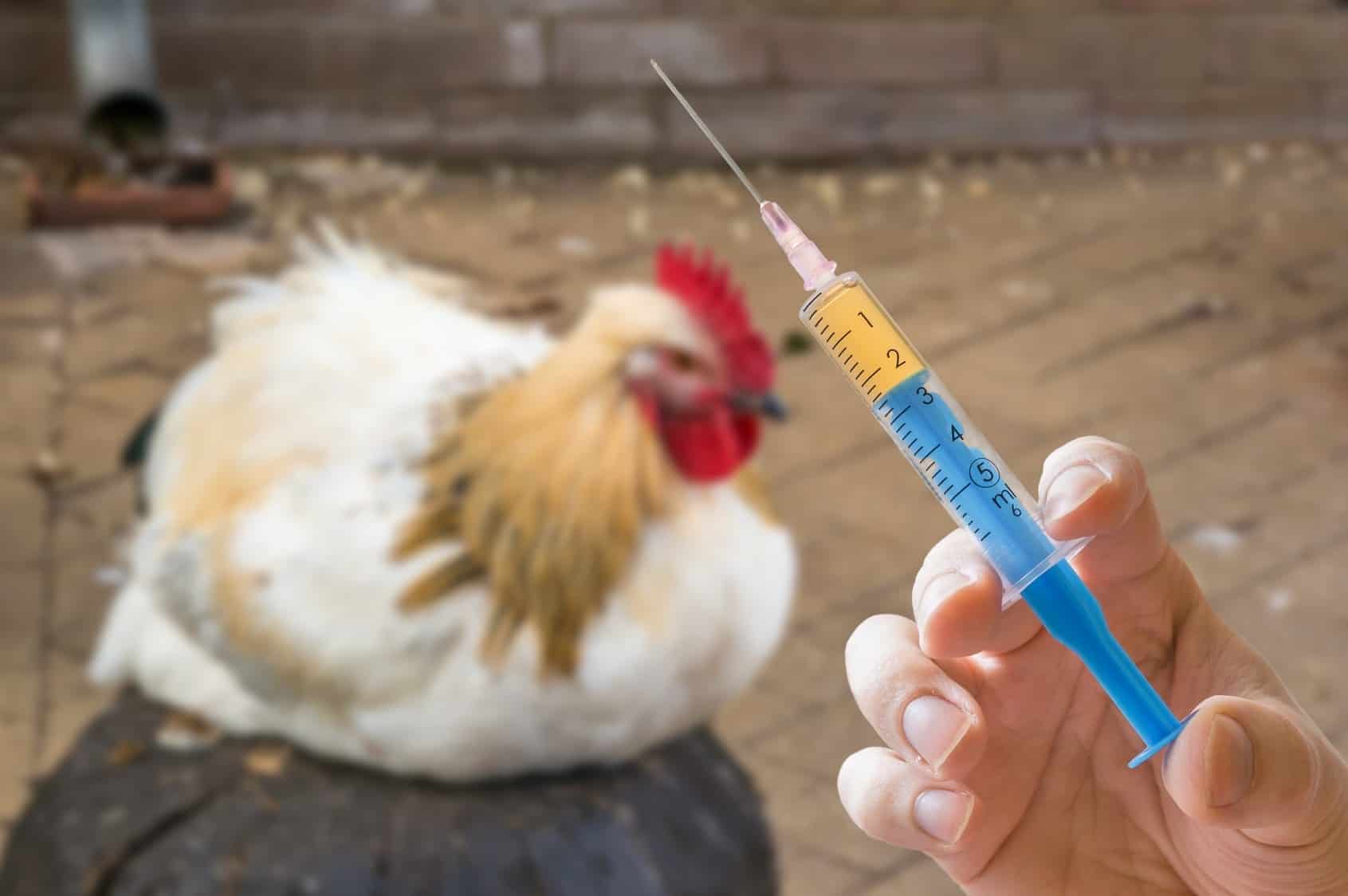There are many common chicken diseases and illnesses. Having a good nutrition plan for chickens is one way to prevent chicken illnesses. Also, there is a lot you can do to help promote a clean and stress-free environment, which will help keep them healthier.
This means preventing contraction of diseases, treating them when they occur, and possibly even culling chickens when they’re in danger of spreading dangerous infections.
Learn all about the most common chicken diseases, chicken disease symptoms, and how to treat them if you find them in your coop. Most chicken illnesses are treatable.
Chicken Diseases
Depending on the chicken sickness, some are more preventable than others. The biggest thing is to make sure it doesn’t spread to your entire flock. Depending on the disease, use caution when eating meat and eggs from chickens who are sick.
Fowl Pox
This disease is usually not deadly, but is known to take the lives of young or particularly weak chickens. It usually lasts 10-14 days in a bird, but can take up to 6 weeks to eradicate from a flock.
Symptoms of Fowl Pox
- White spots on the skin
- Comb sores
- Mouth or trachea ulcers
- Laying stops
It can be contracted from other contaminated chickens, but is also carried by mosquitoes. Fowl pox can be treated with vitamin supplements, particularly Vitamins A, D and E. During treatment, chickens need to eat soft food in order to allow the mouth ulcers to heal.
They also need a warm and dry place to rest. In order to avoid this disease, it’s best to get your chickens vaccinated.
Botulism
Botulism is one of the most serious chicken diseases there is, as the symptoms progress very quickly and the death rate is very high. It’s caused by contamination of food or water by rotting meat, and most commonly occurs in summer and fall, when temperatures are warm enough for the bacteria to thrive.
This illness is not passed on from bird to bird, but can affect an entire flock if they all share the same source of food and water.
Symptoms of Botulism
- Weakness and nervousness
- Tremors or shaking
- Feathers are easy to pull out
- Paralysis of the legs, which progresses to the wings and neck before a chicken then suddenly dies
If the disease is caught early enough, it can be treated with an antitoxin by a vet. However, a home remedy of one teaspoon of Epsom salts mixed with 1 oz of warm water given daily with a dropper can also work.
Infectious Bronchitis
Infectious Bronchitis is a common chicken disease in backyard flocks. This is because most wild flocks develop a resistance to it from increased exposure.
Symptoms of Infectious Bronchitis
- Decrease in eating and drinking
- Discharge from eyes and nostrils
- Coughing, gasping or loud breathing
- Decreased egg laying
- Misshapen or soft-shelled eggs
- Sluggishness
Chickens can be vaccinated against infectious bronchitis. However, this doesn’t guarantee that they won’t be infected. Instead, it just decreases the chance of contracting it. If you notice any symptoms, you’ll need to act quickly. This viral disease is known to spread quickly and can kill entire flocks if left untreated.
There is no specific treatment for infectious bronchitis, but some chicken owners report having success with herbal remedies.
Infectious Coryza
This bacterial disease infects the eyes or nose. Coryza is highly contagious.
Symptoms of Infectious Coryza
- Swollen head or face
- Sneezing
- Coughing
- Discharge from eyes and nostrils
- Reluctance to eat or drink
- Breathing difficulties
- Ceased laying
- Staggering
This chicken disease is usually treated with antibiotics. However, if it has progressed past the point of treatment, infected chickens should be put down to avoid passing the disease on to the rest of the flock. Unfortunately, there is no vaccine against infectious coryza.
Pullorum
This disease is viral and can, therefore, be contracted through contact with other infected birds as well as contaminated surfaces. Like chicken pox in humans, this illness affects infant and adults differently.
Symptoms of Pullorum
- Sneezing
- Coughing
- Poor laying in adult birds
- Breathing difficulties
- Low activity
- White paste on the backsides of chicks
There is currently no vaccine against pullorum, so the best way to protect against it is to be aware of the signs and symptoms, then put down any chickens that contract the disease.
Avian Influenza
Avian Influenza is the most commonly-known chicken disease, also known as Bird Flu. There have been some fears surrounding this illness, as bird flu outbreaks in the news are common, and people are concerned about contracting bird flu themselves.
However, with the correct care, this shouldn’t be a problem.
Symptoms of Avian Influenza
- Respiratory problems
- Diarrhea
- Swelling of the face
- Discolored comb or wattle
- Red spots on the legs
When a chicken contracts bird flu, it will be a carrier of the disease for the rest of its life. For that reason, it will have to be put down.
Some farmers have to cull entire flocks of chickens due to this particular disease. After a cull, a coop must be completely cleaned and disinfected before any new chickens can be introduced. Otherwise, they are at risk of contracting the illness.

Bumblefoot
This is one of the easiest-to-spot chicken diseases. Unfortunately, it’s also virtually impossible to prevent. It’s caused by a cut on the foot, which can be picked up by digging, scratching, or even just walking. When bacteria enters the wound, it can develop into a staph infection. This can be cause for surgery or amputation, and if left untreated, can kill a chicken.
Symptoms of Bumblefoot
- Limping
- Swelling
- Cut or wound on the foot that refuses to heal
The best way to prevent this problem is by checking your chickens’ feet regularly. If they get cut or scratched, disinfected the area and keep it clean and then monitor the healing process.
Coccidiosis
Coccidiosis outbreaks can happen in chicks and in grown chickens. While you may never fully eliminate the coccidia parasite from your flock, you can do a lot of things to prevent and treat coccidiosis.
Ensuring there is enough space for your chickens is imperative. Overcrowding will spread the disease and also leads to less sanitary, healthy conditions. The coccidia parasites multiply in dirty and wet conditions. It also multiplies in warm and hot conditions so keeping the space well-ventilated — but not drafty — is essential.
Regularly cleaning the chicken coop, chicken run, and other areas will go a long way to prevent coccidiosis. Disinfecting the waterers and feeders with bleach or ammonia will help eliminate the parasite.
Freezing temperatures, dry conditions, sunlight will also help kill coccidia parasites.
The medication amprolium is most commonly used treat coccidiosis. (The brand name is Corid and the generic name is amprolium.) You can put liquid amprolium in their drinking water. Corid for chickens is typically prescribed to treat and prevent coccidiosis.
Coccidiosis symptoms:
- Diarrhea
- Dehydration
- Mucus or blood in feces
- Loss of appetite
- No energy, being listless, droopy
- Difference in look of feathers
- Huddling together, being chilled
- Loss of yellow color in shanks
- Pale wattles and combs
- Death
Learn about water belly in chickens.
Keep Your Chickens Healthy and Happy
Do you have a backyard flock of chickens? There are lots of benefits of keeping chickens. However, in order to be a responsible chicken owner, you have to make sure they stay healthy.
In order to prevent chicken diseases and sicknesses, you must keep your birds’ immune systems up and keep the areas as stress-free as possible. Avoid overcrowded conditions, keep the areas ventilated well but not drafty, and clean regularly.
You can do this by providing a hygienic, warm environment for them, with good quality food. See Best Chicken Feed Options for Your Flock.
Choose a good chicken feeder to prevent waste and to keep the feed clean. Also choose a watering system for chickens that will keep the water cleaner.
To improve their quality of life, you can also provide them with toys to play with. Take a look at our post on how to entertain your backyard chickens to get some ideas for how to keep them busy and active.
Like any other animal, chickens love to play. There are many factors which affect how long do chickens live and the quality of their lives. Taking proper care of them is essential and will result in more nutritious eggs and meat for your family.
Chickens Laying Eggs With No Shell
Comparing the Best Chicken Swings
Best Chicken Breeds
Keeping a Rooster Pros and Cons ~ Learn Which is Best for You
10 Tips for Raising Backyard Chickens for Beginners
Best Chicken Coops Reviews


This is important information for me, helping me to know more about common diseases in chickens to help me prevent chickens and chicken care better. I have raised chickens in large numbers so I am very interested in diseases to prevent.
Good information for poultry keeping